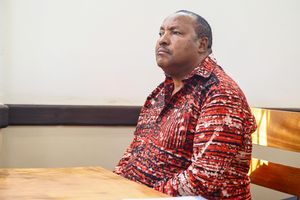
Former Kiambu County Governor Ferdinand Waititu in a police Land Cruiser at the Milimani Law Court on February 13, 2025.
Convicted former Kiambu Governor Ferdinand Waititu is in a fresh tussle with the State.
This is after the Director of Public Prosecutions (DPP) lodged an appeal at the High Court challenging the decision of a magistrate court to acquit him of money laundering criminal charges.
Mr Waititu is serving a 12-year jail term at Nairobi Industrial Area Prison after he was unable to raise a fine of Sh53.5 million following his conviction over corruption for receiving Sh25.6 million kickbacks from a road contractor who had been awarded a Sh588 million tender.
He was convicted on February 12, 2025, alongside his wife Susan Wangari and business couple Charles Chege and Beth Wangechi. Chief Magistrate Thomas Nzyoki, who handed them their sentences, also acquitted them of three charges of money laundering.

Former Kiambu Governor Ferdinand Waititu and his wife Susan Wangari Ndung’u at the Milimani Law Court on February 12, 2025.
However, the DPP, through Senior Assistant Director of Public Prosecutions Vincent Monda, wants the High Court to reverse this decision and punish the four defendants for engaging in money laundering.
"The trial magistrate erred in law in acquitting the accused persons against the overwhelming evidence adduced by the prosecution on behalf of the republic. The magistrate also erred by finding that the DPP had acted in an oppressive and unjustified manner in instituting the money laundering charges," says Mr Monda in the appeal.
In the said charges, they were alleged to have engaged in the transfer of Sh25.6 million from Testimony Enterprises Ltd, which is owned by businessman Charles Chege, to two business entities linked to Mr Waititu: Saika Two Estate Developers and Bienvenue Delta Hotel Ltd.

Businessman Charles Chege in court.
They allegedly committed the offences between July 2018 and March 2019. The State alleges that the money formed part of proceeds of crime.
Penalties
According to Section 16 of the Proceeds of Crime and Anti-Money Laundering Act, the penalty for money laundering charges is an imprisonment term not exceeding 14 years, or a fine not exceeding Sh5 million or the amount of the value of the property involved in the offence.
The DPP further dismissed Mr Waititu’s argument that his health was deteriorating and required special medical care outside the prison facility.
Mr Waititu was convicted for four offences of conflict of interest and dealing with suspect property.
Both his appeal against the conviction and that of the DPP against his acquittal in money laundering charges are pending hearing.






